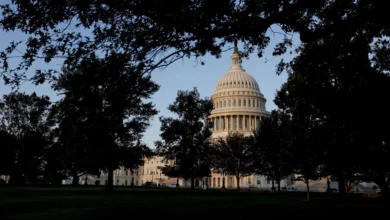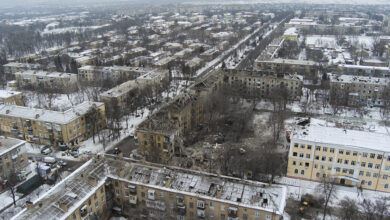Since thrusting himself into the Egyptian political limelight in February, reform advocate Mohamed ElBaradei has pressed for greater transparency and accountability in Egypt's democratic process.
But in his latest rallying cry, a column in The Washington Post published on Sunday, ElBaradei changed his approach slightly by urging global power-wielders to support the nation’s “struggle for freedom,” warning of dangerous repercussions if his pleas are not heeded.
He called for the international community to stop trading stability for reform in the country and to support Egypt's struggle for a more democratic regime.
“The rights of the Egyptian people should not be trampled in exchange for an elusive promise of stability,” wrote ElBaradei, former head of the UN nuclear watchdog, in the article entitled “Egypt’s real state of emergency.”
“The present pseudo-stability based on repression is a ticking bomb that is dangerously close to exploding. Lasting stability in Egypt, as in any nation, will come only through genuine democracy that responds fairly to the needs and aspirations of all its people.”
In recent months, the Washington Post opinion page has become a platform for pressuring Egypt to democratize. Analysts contend this editorial line is part of the agenda of right-wing leaning editor Jackson Diehl.
“It is a new tactic on the part of ElBaradei,” said Ashraf al-Sherif, a political scientist with the American University in Cairo. “But I do not think it would be effective because the best option for the West is to maintain the status quo.”
“The US and the European Union want stability,” added al-Sherif. ”They will not take the risk of having a democratic transition in Egypt especially because there is no political actor on the scene capable of leading Egypt in case of such a development.”
In an interview with Al-Masry Al-Youm published on 23 December, ElBaradei expressed disappointment with the reaction of Western governments to violations that rights group say marred the recent parliamentary poll.
“You see the [US] State Department say they are 'dismayed.' Well, I’m frankly dismayed about their dismay,” ElBaradei told Al-Masry Al-Youm.
“I’m not saying the West has to impose its version of democracy. I’m not saying they’re the one who are going to change Egypt or shift it from a police state to a democracy. But these are human values. If you want to have credibility, you have to be consistent,” he said in the interview.
For decades, Egypt’s ruling regime has kept Western governments convinced that democratization will pave the road for extremists to seize power, threatening Western interests in the region.
This tactic lost currency temporarily after the 9/11 terrorist attacks when the United States realized Middle Eastern dictatorships were exporting terrorists to the West. Ultimately, George W. Bush’s administration began to exert resilient pressure on Arab countries to open up from 2003 until 2006.
Yet, the noticeable victory of the Muslim Brotherhood in the 2005 parliamentary elections was followed by a more significant electoral triumph for Hamas in the Palestinian territories in 2006. The victory sent shocking waves to the US, leading to a retreat of US pressures for democracy.
“Egypt urgently needs a new beginning. The voices of dissent are growing in number. We come from many orientations, from different vocations, from different parts of society, from different faiths. But we speak with a single voice in seeking social justice,” reads ElBaradei’s column.
Since entering the political scene, ElBaradei has risen to the fore as a potential 2011 presidential contender.
Thousands of young Egyptians and prominent intellectuals rallied around the Nobel Prize laureate by promoting his seven reform demands, including lifting the state of emergency and a package of constitutional amendments that would ensure full judicial supervision of elections and ease restrictions on fielding presidential candidates.
In recent months, ElBaradei has been criticized for not staying in Egypt–he spends much of his time in Vienna, Austria where he has resided for more than three decades–and not mobilizing the Egyptian street. For his part, ElBaradei argues Egyptians are not ready yet to break their silence and rally in large numbers.




